Lenovo Launches ThinkPad X1 Extreme With DolbyVision HDR Display and Nvidia Graphics at IFA 2018
from RSS Feeds : RSS NEWS Feed - NDTV Gadgets360.com https://ift.tt/2N1e6Si
Supraja Srinivasan / The Economic Times:
Sources: Amazon acquires Tapzo, an Indian app that lets users access 35 apps like Amazon, Flipkart, Uber, Ola in one place, for up to $45M, to boost Amazon Pay — MUMBAI: Amazon Pay has acquired personal assistant platform Tapzo, its first such deal in India, in a bid to build on and widen the scope of its payment offering.
Bloomberg:
Sources: Lyft has hired an adviser to start the process for an IPO ahead of Uber, targets March or April 2019 for the listing — - Ride-hailing company hiring Class V to help with process — Uber CEO reaffirms 2019 IPO target, following CFO's comments
Yimian Wu / China Money Network:
China-based P2P lender X Financial files for $250M US IPO, says it has booked $270M in revenues in 2017, up 676% YoY — Chinese online P2P lender X Financial has filed for an initial public offering in the US seeking to mop up to US$250 million, according to its IPO prospectus.
Patrick Holland / CNET:
Netgear and Harman Kardon unveil the $300 Orbi Voice, a smart speaker with Alexa support that also acts as an extender for Netgear's Orbi Wi-Fi mesh router — Though Amazon Echo and Google Home are two of the most popular smart speakers on the market, other premium speakers …
NASDAQ.com:
111, China-based online drugstore and healthcare platform, sets US IPO range to $14-$16/share, will raise $140M at $1.5B valuation at the midpoint of the range — 111, which runs an online retail drugstore and healthcare platform in China, announced terms for its IPO on Wednesday.
Bloomberg:
Sources: Google, via a deal with Mastercard, gets data that lets it match clicks on retailer ads to purchases in offline stores; Google says data is anonymized — Google found the perfect way to link online ads to store purchases: credit card data — For the past year …
Sarah Perez / TechCrunch:
YouTube announces YouTube Giving, a suite of new tools for creators and their fans to raise money for charities in the US and Canada, currently in beta — YouTube today announced a suite of new features designed to offer creators and their fans new ways to contribute to charitable causes.
Emil Protalinski / VentureBeat:
Mozilla says Firefox will soon block web trackers by default, starting with trackers that slow page loads in Firefox 63 and cross-site trackers in Firefox 65 — Mozilla today announced that Firefox will soon block web trackers by default. In conjunction, Firefox will also let users control what information they share with sites.
Stephen Hall / 9to5Google:
Alleged Google Pixel 3 photos leak, show a traditional bezel and 5.5" 2160x1080 resolution display, Snapdragon 845 CPU, Adreno 630 GPU, and 2,915 mAh battery — The smaller Google Pixel 3 has managed to avoid the real-life photo leak treatment up to now, but the time has finally come.
Chris Welch / The Verge:
This is Google's no-notch Pixel 3 smartphone — It's the mini Pixel 2 XL we expected — Well, it was bound to happen. After several consecutive weeks of leaks spilled nearly every detail about its larger Pixel 3 XL counterpart, the first real-world photos of Google's Pixel 3 have been published by 9to5Google.
Andrew J. Hawkins / The Verge:
San Francisco grants permits for one-year e-scooter pilot program to Scoot and Skip; Santa Monica selects Jump, Lyft, Lime, and Bird for its e-scooter pilot — Skip and Scoot, two underdogs in the scooter war, won the coveted permits — After more than two months of waiting …
Paul Thurrott / Thurrott.com:
Lenovo announces a range of new Windows laptops, Chromebooks, and the Lenovo Smart Home Essentials line, including a smart plug and smart bulb for $29+ — Lenovo today announced several new consumer PCs, an “extreme” version of its ThinkPad X1 Carbon, three new Chromebooks, and several new smart home devices.
Bloomberg:
Xiaomi-backed connected home appliances maker Viomi files for a US IPO, says it had $14M in net income on net revenue of about $132M in 2017 — Viomi Technology Co., a provider of internet-connected home appliances to Chinese smartphone giant Xiaomi Corp., filed for a U.S. initial public offering.
Zac Hall / 9to5Mac:
Image of the new Apple Watch Series 4, with a larger, edge-to-edge display and new watch faces, leaks — In addition to discovering exclusive iPhone XS details today, 9to5Mac can exclusively share the first look of the new Apple Watch Series 4. This is the new Apple Watch that we believe Apple …
Sahil Patel / Digiday:
CoinDesk has formed a new business unit called CoinDesk Productions to develop long-form documentaries and TV shows “rooted in crypto and blockchain technology” — CoinDesk is well-known as a news site covering everything happening with the blockchain and cryptocurrencies.

Twitter is only as good as the people you follow. Which is why so many people struggle to get the most out of Twitter, as they join the site, follow a handful of people, and then get bored. On the other hand, it’s possible to follow too many people.
Following too many people means a timeline filled with uninteresting nonsense. And the need to scroll through tweets you have no interest in to get to the good stuff. Which is why Twitter recently started recommending who you should stop following.
This was spotted by several Twitter users, some of whom took screenshots of the recommendations. Twitter has long recommended “Who to Follow” based on who you’re already following, so this would seem to be the natural balancing force.
Matt Navarra was invited to “improve your timeline by reviewing some accounts you may not need to follow”. Clicking “Take a look” then opened up a list of accounts Twitter thought he could live without. Probably due to a lack of engagement.
Twitter is now suggesting accounts to UNFOLLOW!
h/t @medavep who got told to unfollow me! pic.twitter.com/PNaY7aQ9i0
— Matt Navarra (@MattNavarra) August 29, 2018
The wording was different for different people. Tim Fernholz’s was much more to the point, saying, “You don’t need to follow everyone to know what’s happening. Make sure you’re only following the people that make Twitter great for you.”
top people I should apparently unfollow? Thanks, twitter… pic.twitter.com/Uiyn5kApTS
— Tim Fernholz (@TimFernholz) August 29, 2018
Twitter issued a statement to Slate saying:
“We know that people want a relevant Twitter timeline. One way to do this is by unfollowing people they don’t engage with regularly. We ran an incredibly limited test to surface accounts that people were not engaging with to check if they’d like to unfollow them.”
So, it was a test, and one limited to a small percentage of Twitter users. Still, Twitter hasn’t yet indicated whether it deemed the test to be a success and whether it’s likely to be rolled out to more users in the future. So this could be the last we see of it.
Suggesting people you should unfollow makes a lot of sense. After all, Twitter knows which tweets you’ve read, which links you’ve clicked on, and which profiles you’ve explored. So why not let them help you decide who is surplus to requirement?
Whether you’re new to the site or have been tweeting for years you should probably read our guide to using Twitter. And then take the opportunity to go through the list of people you follow and cull any you no longer have any interest in engaging with.
Image Credit: Bram Koster/Flickr
Read the full article: Twitter Tests Telling People Who to Unfollow

Tumblr is updating its community guidelines to tackle certain behaviors. The changes mean Tumblr is cracking down on hate speech, violent threats, and non-consensual sexual content. The new guidelines are set to come into effect on September 10.
While many other social networks have been cracking down on hate speech (with the exception of Twitter), Tumblr has remained silent. However, the staff has clearly decided that now is the right time to change its community guidelines to protect its users.
In a blog post, Tumblr states it’s changing its community guidelines in order to “keep Tumblr the constructive, empowering place it should be”. Tumblr loves its “diverse, kinetic, passionate communities” but they’re not always easy to police.
Tumblr is acting now as it believe its community guidelines need to “reflect the reality of the internet and social media today and acknowledge that the things people post and share online influence the way others think and behave.”
Anthropologists Are On The Verge Of Figuring Out How You’re Supposed To Read Tumblr Comments https://t.co/XHmFRjN9EK pic.twitter.com/Khmy4gJqnB
— ClickHole (@ClickHole) August 30, 2018
First, Tumblr is cracking down on hate speech. This is to ensure against the internet “being exploited by hate groups to organize, recruit, and radicalize with horrifying efficiency.” Specifically, Tumblr is asking users to report hate speech whenever they encounter it.
Next on the agenda is an attempt to ban “the glorification of violence and its perpetrators”. While violent threats against individuals and groups have always been against the rules, Tumblr has added the ban on posts glorifying acts of violence.
Finally, Tumblr is expanding its ban on sexual imagery and sexual harassment. This is specifically targeting deepfakes and creepshots, which Tumblr describes as “new technologies that can be used to humiliate and threaten other people”.
Tumblr’s new community guidelines will go into effect on September 10, 2018. After which any post breaking the rules will be taken down. Not that we should expect things to be that simple, as there is an ongoing debate about hate speech versus free speech.
Read the full article: Tumblr Finally Cracks Down on Hate Speech
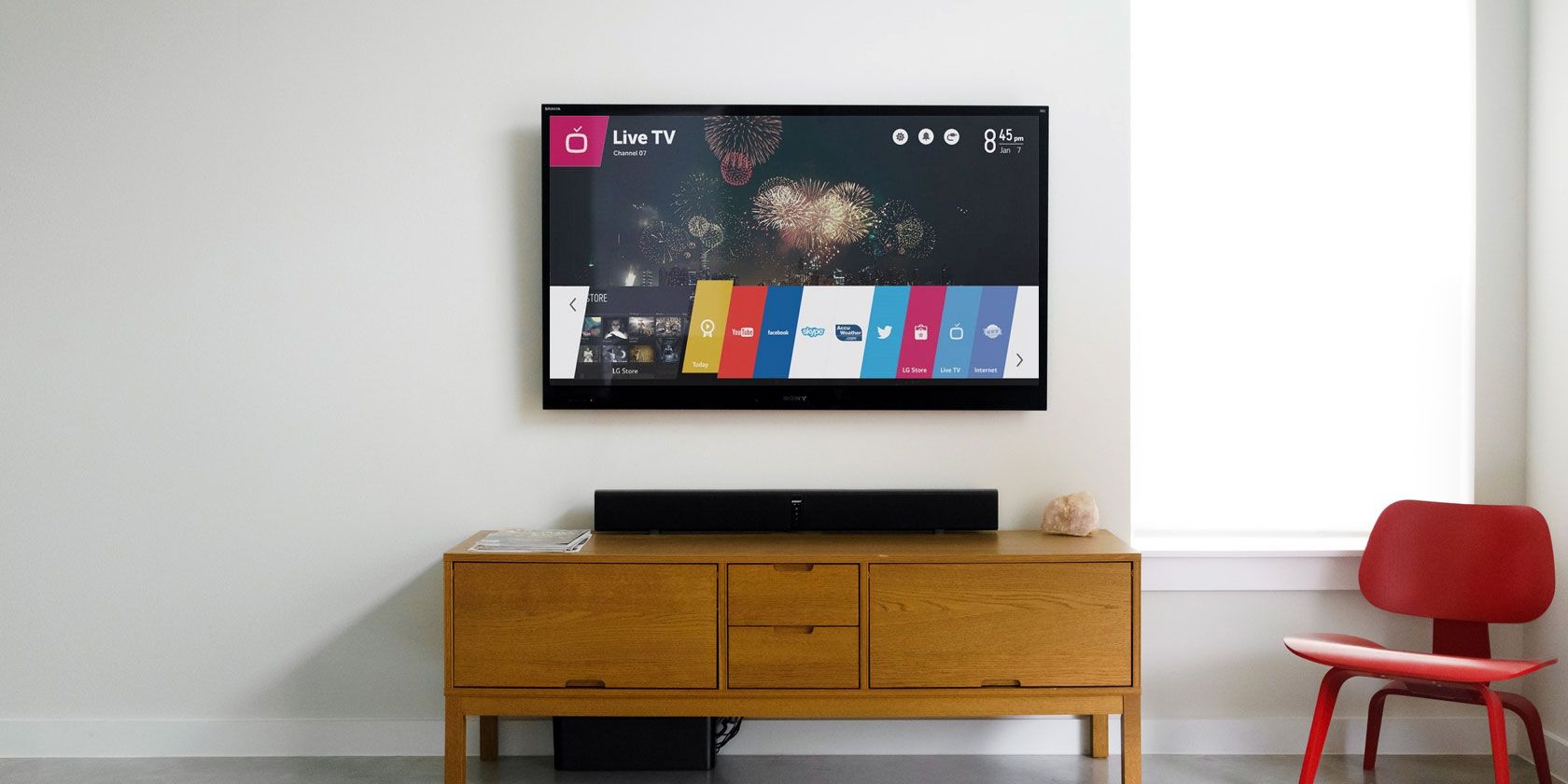
There are lots of things you need to know before buying a smart TV. What size do you want? How many HDMI ports do you need? Any extra features that are important to you?
But there’s one question that people often overlook: which operating system should you buy? This article will help you answer that question.
It isn’t 2016 anymore. Back then, we were telling readers why you should avoid buying a smart TV. But in the intervening years, a lot has changed.
It’s now almost impossible to find a new TV that isn’t “smart.” Take a trip to your local electronics store, and you’ll be overwhelmed with promises of streaming, casting, sharing, and all the smart TV buzzwords.
But, not all smart TVs are created equal. Much like the world of desktop operating systems, the various smart TV operating systems have their own strengths and weaknesses. Some have a more extensive choice of apps, some have a better user interface, some are more compatible with third-party devices, and so on.
So, which is the best? In this article we pit Roku TV, Android TV, Fire TV, WebOS, and TizenOS against each other to see which smart TV operating system is best.
In 2017, Roku launched a lot of new hardware, but the Roku TV operating system survived the cull.
The OS includes the best parts of the Roku set-top boxes but also throws in some extra features that are unique to the platform.
For example, unlike the other products in the Roku range, you can connect an HDTV antenna to a Roku TV and enjoy a full electronic program guide (EPG) from within the Roku ecosystem.
Roku TV has also benefited from staying well clear of the seemingly never-ending bickering between Amazon, Google, and Apple. As such, you’ll find all the most popular apps from all the providers (unlike Amazon Fire TV, which does not have a YouTube app).
Other features include a universal search function, a customized feed of upcoming shows you’ll be interested in, and a private listening mode.
Many manufacturers offer Roku TV televisions, including TCL, Element, Insignia, Philips, Sharp, RCA, Hitachi, and Hisense.
Of course, like all Roku products, you can also install private channels. They provide access to TV content which isn’t available in the main store. We’ve previously looked at the best private Roku TV channels if you would like to learn more.

WebOS is LG’s smart TV operating system. After a curious history, the OS finally emerged as the leading smart TV operating system in 2014 thanks to its slick and easy-to-use interface.
Since 2014, LG has been steadily refining the OS, and it’s now found in everything from fridges to projectors.
The operating system revolves around the launch bar at the bottom of the screen. On the bar, you will find all your apps and settings. You can customize the order of the bar so the apps you use most frequently show up first.
WebOS is Bluetooth compatible, meaning it’s easy to hook up keyboards, mice, and other useful peripherals. It is also Miracast compatible. (Miracast is a cordless version of HDMI!)
Other noteworthy features include live apps (so you can pause content in one app, start using another app, then return to the first app and pick up where you left off later in the day), 360-degree video playback, and an OLED image gallery.
If you’re looking for crisp and clean, WebOS is the clear winner.

Android TV is probably the most common smart TV operating system. And, if you’ve ever used an Nvidia Shield (one of the best devices for cord cutters), you’ll know that the stock version of Android TV takes some beating in terms of the feature list.
However, with Android being Android, you will not get a consistent user experience across different TV manufacturers. They all feel the need to put their own “twist” on it, usually for the worse. Error messages saying that a part of the OS system has stopped working are not uncommon on non-stock implementations.
On a more positive note, any television running Android TV will also have Chromecast built in. It makes streaming or casting content from your Android phone or tablet a breeze.
You can also cast directly to your TV from your computer as long as you have Chrome installed. Just go to Menu > Cast to begin.
You also be able to use Google Assistant. That means you can use your voice—via your TV—to control all your smart home devices such as lights, speakers, thermostats, electrical sockets, and more.

TizenOS is a Linux-based operating system that has been developed by The Linux Foundation.
You will only find TizenOS on Samsung devices. It’s in all of the company’s products, including TVs, cameras, ovens, and air conditioning units.
Of course, TizenOS has a bad reputation following the Samsung TV “spy-gate” in 2015. To be fair, those issues are long in the past. Samsung TVs don’t spy on your any more (at least to our knowledge). However, Tizen still leaves a lot to be desired as a smart TV OS.
Visually, the operating system is fine. It’s clearly taken a lot of design cues from WebOS; there’s a horizontal bar at the bottom of the screen with all your apps and content.
Criticism comes in two forms. Firstly, it’s not as intelligent as some of the other operating systems on this list. For example, while Roku learns what you like and suggests new content from all the apps you have installed on the OS, TizenOS merely suggests apps that you haven’t opened for a while. It’s not inspiring.
Secondly, it faces accusations of being too simplified. Whereas WebOS strikes a perfect balance, tech-savvy users will find the fun settings hidden being endless buttons and submenus.
U.K. users will also bemoan the lack of Freeview Play. It’s a repo of programs from all of Britain’s major OTA TV networks and is available on most of Samsung’s competitors’ TV sets.
Fire TV Edition is the new kid on the block. As the name suggests, it’s the smart TV operating system version of the popular Amazon Fire TV devices. At the time of writing, you will only find Fire TV Edition on Toshiba and Element televisions.
Fire TV Edition also gives you access to Amazon Alexa. Like Google Assistant, it can control your smart home, update you on the news and weather, and engage with other apps that form part of your daily workflow.
Content-wise, you’re limited to apps that are available in the Amazon Appstore. Even though Fire TV is based on Android, you cannot access the Google Play Store. Nonetheless, most mainstream apps are available, with the notable exception of YouTube.
However, you can sideload apps onto Fire TV devices, and Fire TV Edition is no different. You just need to get your hands on the APK file for the app you want.
Check out our article looking at the different versions of Fire TV if you’re not sure whether Fire TV Edition is right for you. And if you’ve already bought a new Fire TV Edition, make sure you check out our list of essential Fire TV apps.
We’re going to call it a three-way tie between Android TV, WebOS, and Roku. In truth, each of the smart TV operating systems excels in a different area, but Amazon Fire falls flat due to the lack of YouTube and the Google Play Store, while TizenOS is by far the weakest of the bunch.
If you want slick and minimal, go for WebOS. If you want the largest selection of apps, choose Roku. And if you want smart assistant capabilities, pick Android TV.
If you’d like to learn more about smart televisions, check out our list of smart TV lies you have probably fallen for.
Read the full article: What Is the Best Smart TV Operating System?
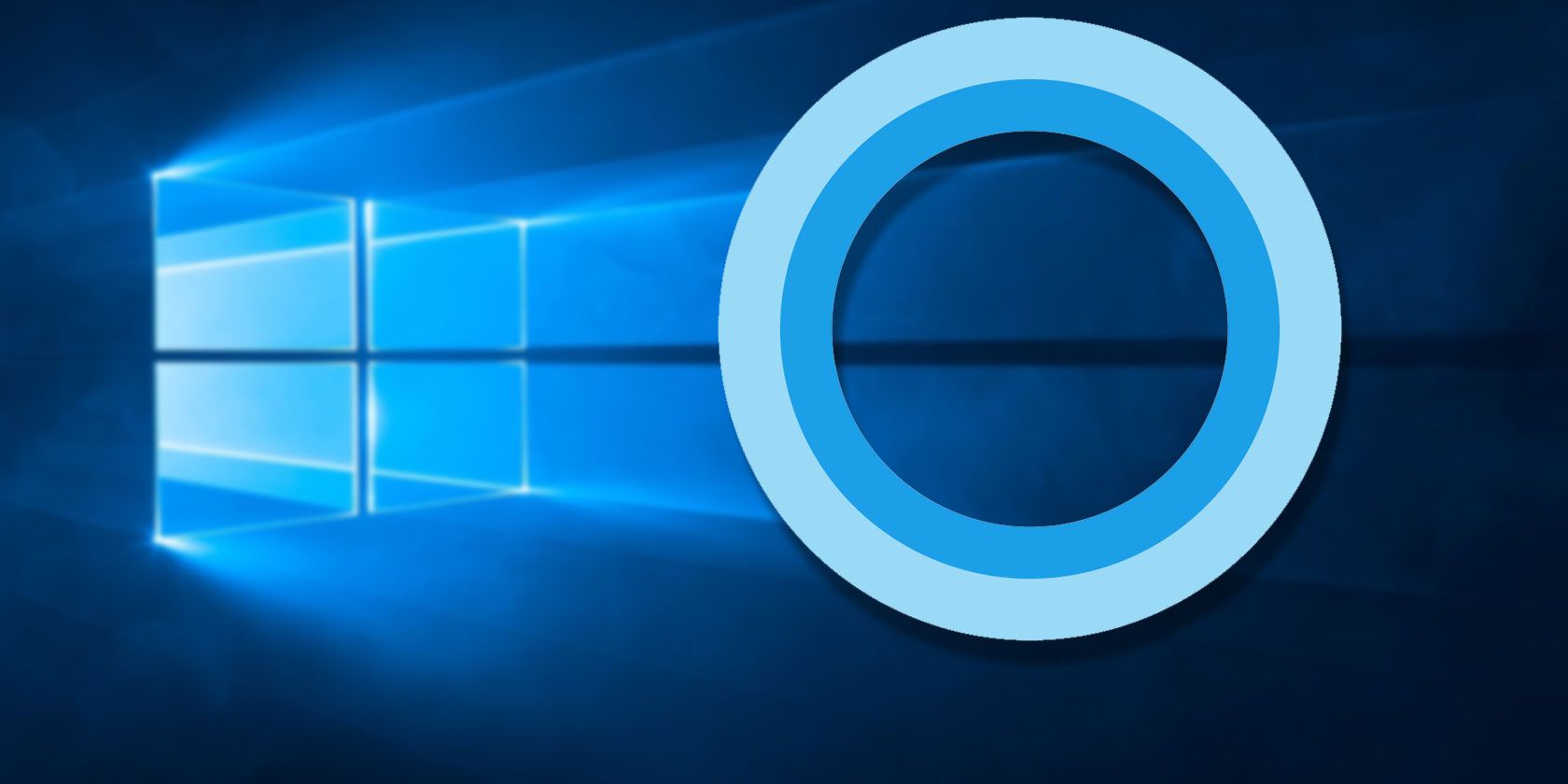
Cortana is Microsoft’s virtual assistant that helps you improve your productivity. You can use it for many purposes like searching the internet or your computer, finding answers to questions, setting reminders for yourself, and managing your tasks.
Cortana can organize your life and you can ask it all kinds of things. You can also customize the look and behavior of Cortana. Today, we’ll show you seven ways to do just that.
For several of these customizations, you must make changes to the registry by adding and changing keys and values in the registry.
You should also back up the registry before making changes to it.
To revert changes you made to the Windows registry, you can reset the registry to the default values.
After making the changes to the registry that we talk about here, you must restart Windows Explorer. To do so, press Ctrl + Shift + Esc to open the Task Manager.
If a File Explorer window is currently open, select Windows Explorer under Apps on the Processes tab. If not, scroll to the bottom of the Windows processes list on the Processes tab and select Windows Explorer there.
Then, click Restart.
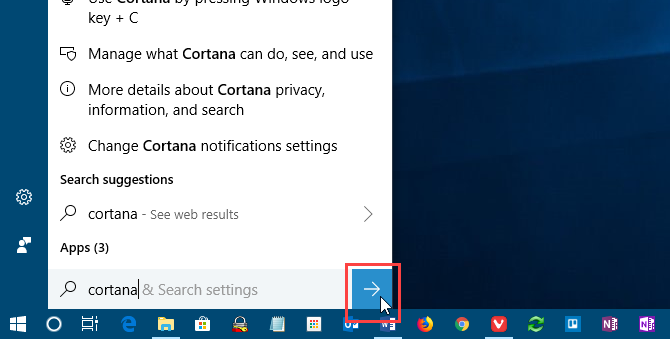
When using Cortana, you can enter your question or search term and press Enter to get results. But if you prefer using the mouse, you can display a Submit button on the right side of the Cortana search box and click that to get results.
Open the Registry Editor, navigate to the following key, and select Flighting.
HKEY_CURRENT_USER\Software\Microsoft\Windows\CurrentVersion\Search\Flighting
On the right, you’ll see two values, Current and RotateFlight. Make sure they are both set to 0 in the Data column.
Next, look for a key named ShowSubmitButtonRightOfSearchBox under the following key in the left pane. If it’s not there, create it.
HKCU\Software\Microsoft\Windows\CurrentVersion\Search\Flighting\0
Then, create a new DWORD (32-bit) Value named Value. Set Value to 1 to add the Submit button to the Cortana search box.
Close the Registry Editor and restart Windows Explorer.
To remove the button, change the Value for the ShowSubmitButtonRightOfSearchBox key to 0.
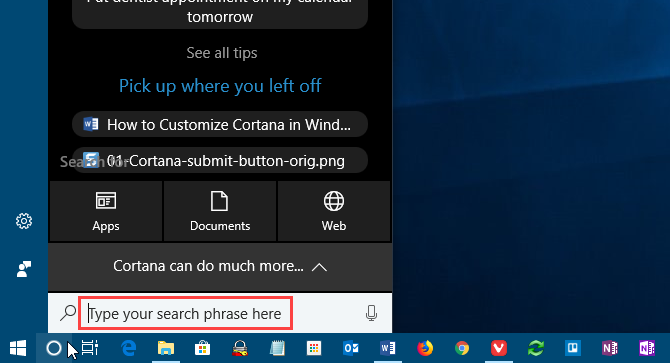
Cortana shows some default text in the search box. It was “Ask me anything” at one point. Now it’s “Type here to search”. You can change this text or remove it if you’d rather see a blank search box.
Open the Registry Editor, navigate to the following key, and select SearchBoxText.
HKEY_CURRENT_USER\Software\Microsoft\Windows\CurrentVersion\Search\Flighting\0\SearchBoxText
Change the value of the Value key in the right pane to the text you want to see in the search box. To remove the text from the search box, change Value to just a space.
Close the Registry Editor and restart Windows Explorer.

By default, the background of the Cortana search box is semi-transparent. You can change this to opaque (white) or fully transparent. When the search box is fully transparent, the color of the Taskbar shows through it.
Open the Registry Editor, navigate to the following keys. If they don’t exist, create the SearchBoxTransparencyBackground key under both the 0 key and the 1 key under the Flighting key.
HKEY_CURRENT_USER\Software\Microsoft\Windows\CurrentVersion\Search\Flighting\0\SearchBoxTransparencyBackground HKEY_CURRENT_USER\Software\Microsoft\Windows\CurrentVersion\Search\Flighting\1\SearchBoxTransparencyBackground
Then, create a new DWORD (32-bit) Value named Value. Set Value to one of the following values. Make sure you select Decimal as the Base on the Edit DWORD (32-bit) Value dialog box before entering the value.
Or enter any other value between 0 and 100 or a custom transparency level.
Close the Registry Editor and restart Windows Explorer.
To return to the default of semi-transparent, change the Value for the SearchBoxTransparencyBackground key to 60 or delete the SearchBoxTransparencyBackground key you added under both the 0 key and the 1 key under the Flighting key.

When you move your mouse over the Cortana search box, a semi-transparent highlight displays on the box. You can change this highlight to be opaque (white) or fully transparent so the color of the Taskbar shows through.
Open the Registry Editor, navigate to the following keys. If they don’t exist, the SearchBoxTransparencyHighlight key under both the 0 key and the 1 key under the Flighting key.
HKEY_CURRENT_USER\Software\Microsoft\Windows\CurrentVersion\Search\Flighting\0\SearchBoxTransparencyHighlight HKEY_CURRENT_USER\Software\Microsoft\Windows\CurrentVersion\Search\Flighting\1\SearchBoxTransparencyHighlight
Then, create a new DWORD (32-bit) Value named Value. Set Value to one of the following values. Make sure you select Decimal as the Base on the Edit DWORD (32-bit) Value dialog box before entering the value.
Or enter any other value between 0 and 100 or a custom transparency level.
Close the Registry Editor and restart Windows Explorer.
To return to the default highlight color of semi-transparent, change the Value for the SearchBoxTransparencyHighlight key to 80 or delete the SearchBoxTransparencyHighlight key you added under both the 0 key and the 1 key under the Flighting key.

The default text in the Cortana search box is semi-transparent. You can change this to opaque (white) or fully transparent. If you make the text fully transparent, it appears hidden.
Open the Registry Editor, navigate to the following keys. If they don’t exist, create the SearchBoxTransparencyForeground key under both the 0 key and the 1 key under the Flighting key.
HKEY_CURRENT_USER\Software\Microsoft\Windows\CurrentVersion\Search\Flighting\0\SearchBoxTransparencyForeground HKEY_CURRENT_USER\Software\Microsoft\Windows\CurrentVersion\Search\Flighting\1\SearchBoxTransparencyForeground
Then, create a new DWORD (32-bit) Value named Value. Set Value to one of the following values. Make sure you select Decimal as the Base on the Edit DWORD (32-bit) Value dialog box before entering the value.
Or enter any other value between 0 and 100 or a custom transparency level.
Close the Registry Editor and restart Windows Explorer.
To return to the default highlight color of semi-transparent, change the Value for the SearchBoxTransparencyForeground key to 30 or delete the SearchBoxTransparencyHighlight key you added under both the 0 key and the 1 key under the Flighting key.
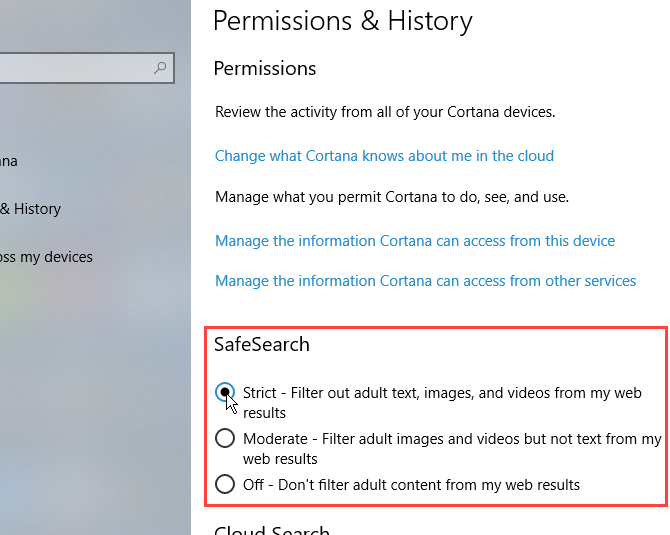
Search engines like Google, Bing, and Yahoo have settings you can adjust to help keep your kids safe online. Cortana also has a SafeSearch feature.
By default, SafeSearch is set to the Moderate level. To change this setting, open the Start menu and click PC Settings.
Then, click Cortana, or Cortana & Search if you’re running the Windows 10 Insider Preview Build 17623 or later.
In the left pane, click Permissions & History. On the right, select Strict, Moderate, or Off under SafeSearch.
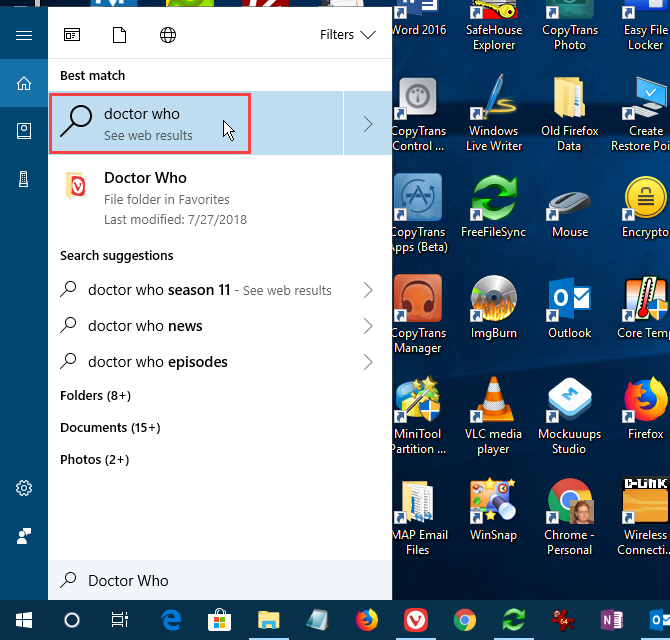
When you do a search in Cortana and click on a web results option, those Bing search results are displayed in Edge by default. If you use a screen reader, you may want to open web search results from Cortana in Internet Explorer instead, where the results are optimized for screen readers.
To have Cortana web search results open in Internet Explorer, open Microsoft Edge.
Then, click the menu button (three horizontal dots) in the upper-right corner of the window and click Settings.
Scroll down to the bottom of the Settings pane and click View advanced settings under Advanced settings.
Click the Optimize taskbar web search results for screen readers slider button to turn it On.
Close Microsoft Edge. The next time you click on web search results in Cortana, they will open using Bing in Internet Explorer.
You can also force Cortana to use Google and Chrome, if you don’t like Bing and Edge or Internet Explorer.
Continue to work with Cortana and it will become a part of your workflow. Now that you’ve customized Cortana the way you want, try out some cool Cortana commands, or you can even create your own custom Cortana skills.
Read the full article: 7 Ways to Customize Cortana in Windows 10

You’re in the middle of a Raspberry Pi project, when all of a sudden you realize there’s something wrong: fixing it means editing the config.txt file, which is found in the /boot/ directory.
But what is the easiest way to access this file while the Raspberry Pi is still running? And if you have to shut down to retrieve the microSD card, how should you edit it? Here’s everything you need to know.
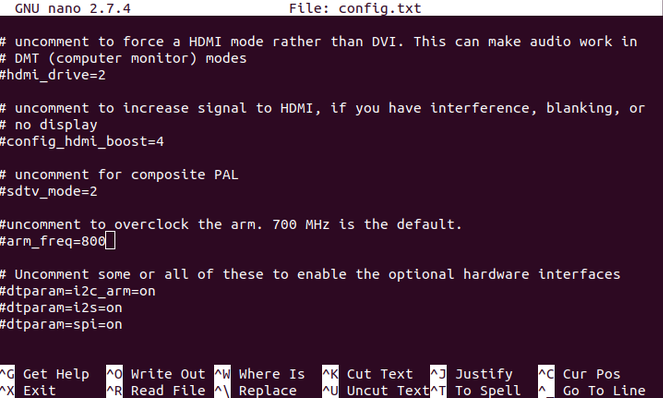
The Raspberry Pi’s default operating system (and most of the alternatives) rely on some configuration parameters that are read when the computer boots from the microSD card. These are stored in the config.txt document, found in the /boot/ folder.
Such instructions might adjust the way the display is detected and the desktop displayed; config.txt can even be used to overclock your Raspberry Pi (or return to default clock settings).
Both of these settings are logged in config.txt as neither can be changed on a running Raspberry Pi. If the display isn’t detected, you cannot alter any desktop settings.
Similarly, if the Pi has been overclocked and won’t boot, or repeatedly restarts, you won’t be able to access raspi-config to reset it. Instead, config.txt is provided to give you the option of resetting your Raspberry Pi’s clock speed.
It’s also possible to alter the USB boot mode from within config.txt, just as it is to tweak audio settings.
If you need to edit the config.txt file while Raspbian is running, you should be able to browse to it. You’ll find the /boot/ folder in the root directory of the microSD card. Once you’ve found it, simply double click to open, and edit it in your default text editor.
However, if you’re planning to edit the file, it’s a good idea to retain the original. Make a copy of the file using your file manager, giving it a different, but descriptive name. Once you’ve done this, you’ll easily be able to restore the original should run into trouble with the edited version.
You can also create a copy in the terminal using
mv config.txt backupconfig.txt
Again, give your copy a meaningful name. Note that when editing the config.txt file, no changes will be applied until you reboot your Raspberry Pi.
Rarely connect a keyboard to your Raspberry Pi? As long as the computer is on the network, you should be able to edit the config.txt file remotely. Do this by connecting via SSH (or VNC or RDP) and browsing to the /boot/ directory. You’ll need to use the
cd /
command to step up a level from the default /home/ directory in Raspbian. Here, use
ls
to list the contents of the root directory. Find /boot/ then
cd /boot
open it, again listing the contents. Here, you should find config.txt. To read or edit the text file, use the nano text editor, which comes preinstalled (although others are available).
sudo nano config.txt
Once the changes have been made, press Ctrl + X to save and exit. Remember to reboot your Raspberry Pi after making changes.
sudo reboot
Linux, Windows, and macOS computers should be able to access the config.txt file via the microSD card. This means shutting down your Raspberry Pi (safely, in order to avoid data corruption) and ejecting the SD card. Insert it into your computer’s card reader to check the contents.
If you need to edit the config.txt file on a Linux PC, find the disk listed in your default file manager when inserted. It should be listed as two devices, the main volume (typically “1.8GB Volume” as per the size of the default Raspbian partition), and boot.
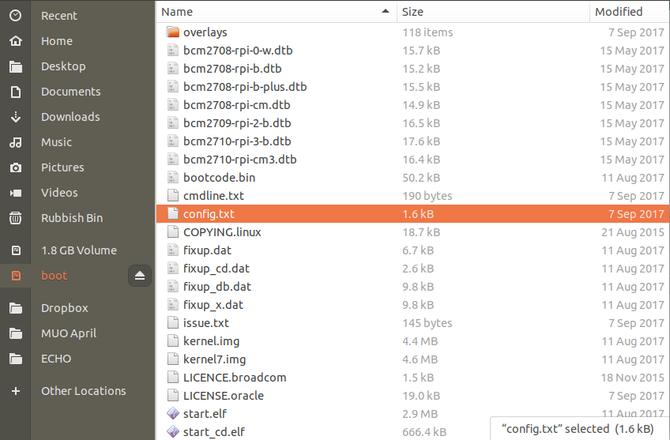
As you might have guessed, this is the volume you need to access. It is essentially the /boot/ directory mounted as a drive. Open this to find config.txt. Save any changes you make in your default text editor, then use the Eject button in the file manager to safely eject the SD card.
Inserting the Raspberry Pi’s SD card on a Windows computer should result in it being instantly mounted, and accessible via Windows Explorer. However, while two partitions will be displayed on the device, only one, boot, will be accessible in Windows.
Select this, then find config.txt. Use the default Notepad text editor to make edits (or an alternative, such as Notepad++), then save and exit when you’re done.
To safely eject the SD card, right-click the drive in My Computer, and select Eject.
If you’re using a Mac, you should find the card appears on your desktop when it is detected. Use the Finder to browse the contents, looking for a file called config (without the TXT file extension). Read and edit the file in the TextEdit app, ensuring that any changes you make are saved when you exit. To eject the card, drag the desktop icon to the Trash, or click Eject in Finder.
Whichever method you use to edit the config.txt from the microSD card read on your PC, remember to safely eject the device before returning it to your Raspberry Pi.
The config.txt file is just one of several ways to edit your Raspberry Pi’s general configuration. You’re probably already aware of the raspi-config screen, accessed via the terminal. There’s even a desktop-based Raspberry Pi Configuration Tool, found in the Preferences menu on Raspbian Jessie and Raspbian Stretch.
Tweaking the Pi’s configuration can save a lot of time if you get it right. To help ensure the computer is set up as you intend, why not take a look at the PiBakery? This is a software tool that uses a block-based approach to help you preconfigure various Raspberry Pi settings in Raspbian, from the Wi-Fi SSID and password to running custom scripts.
Read the full article: 3 Ways to Edit the boot/config.txt File on Raspberry Pi
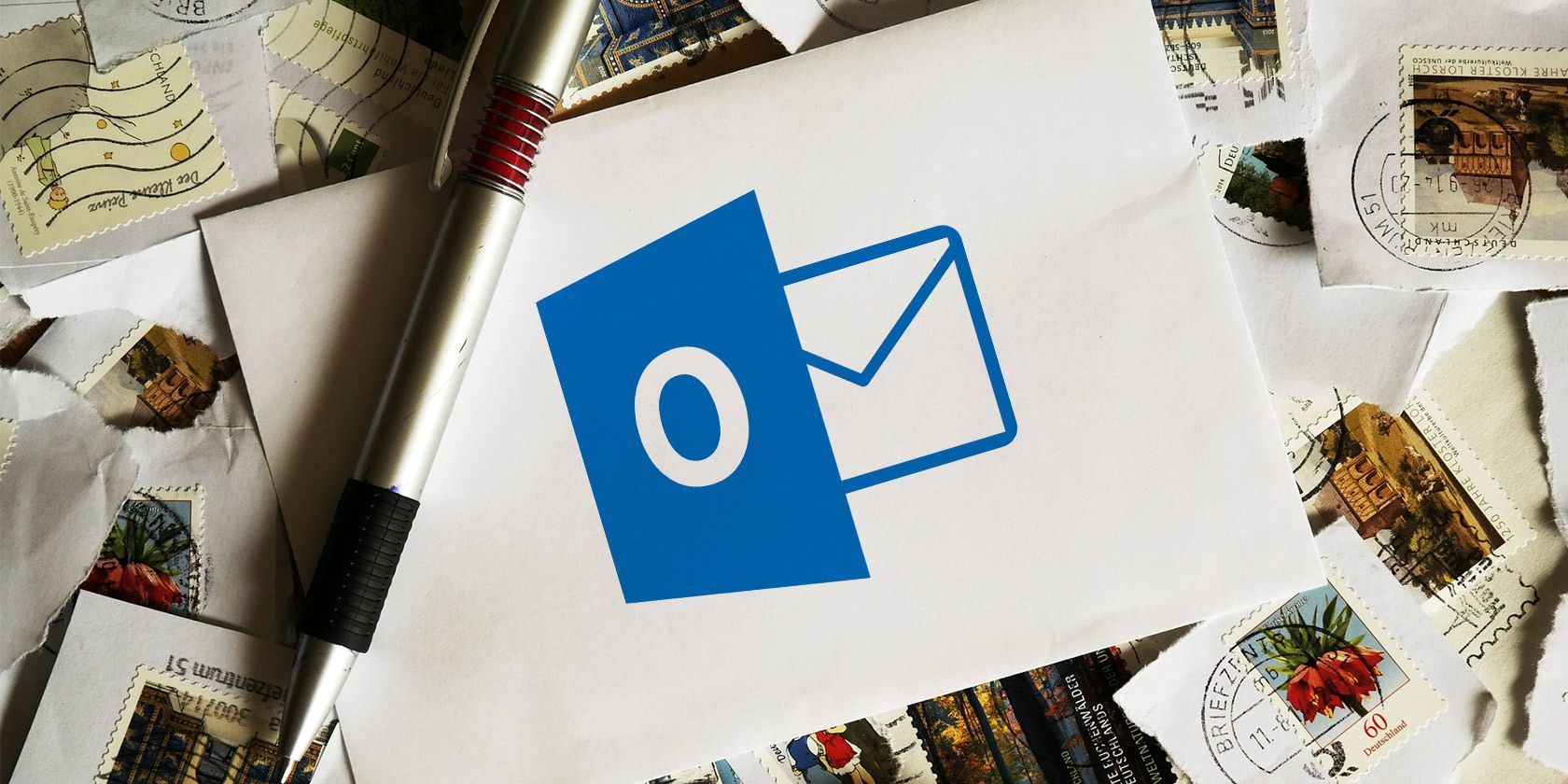
If you use Outlook, you already know it’s a useful program for managing your email and includes a lot of great features. Today we’re going to cover some lesser known Outlook features that could help improve your workflow.
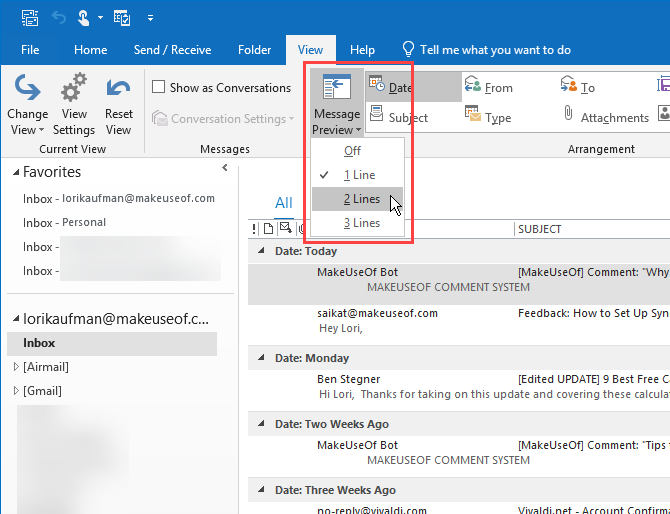
In the list of email messages, Outlook displays a preview of each message. This includes the sender and the subject line on the first line and then one line from the email message body below that by default.
You can change the number of lines from the message that displays in the list of messages.
Go to the View tab and click the Message Preview button. Then, select 1 Line (default), 2 Lines, or 3 Lines. Or select Off if you don’t want any of the email message displayed in the list.
You’ll be asked if you want to apply this setting to only This folder or All mailboxes.
The number of lines you select does not include the sender and subject line. So if you select 2 Lines, you ‘ll see three lines total: the sender and subject on the first line and then two lines of the email message body below that.
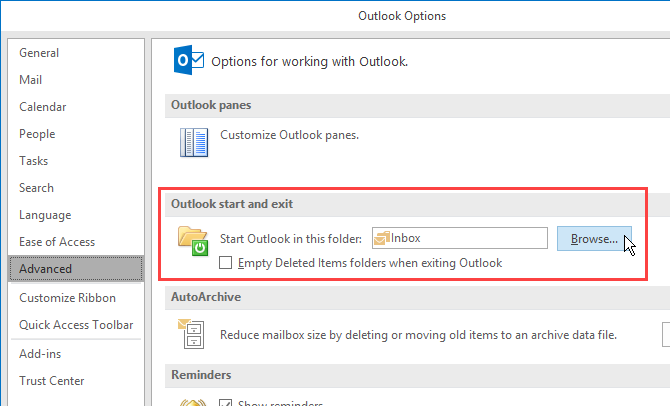
If you have multiple email accounts in Outlook, you can select which email account inbox you want displayed by default when you open Outlook. Or you can select another folder besides the inbox if you want.
Go to File > Options and click Advanced in the left pane on the Outlook Options dialog box.
In the Outlook start and exit section, click Browse. On the Select Folder dialog box, find the account you want and select the Inbox, or other folder you want to start Outlook in.
We found that this setting doesn’t always stick. Let us know in the comments if it worked for you.
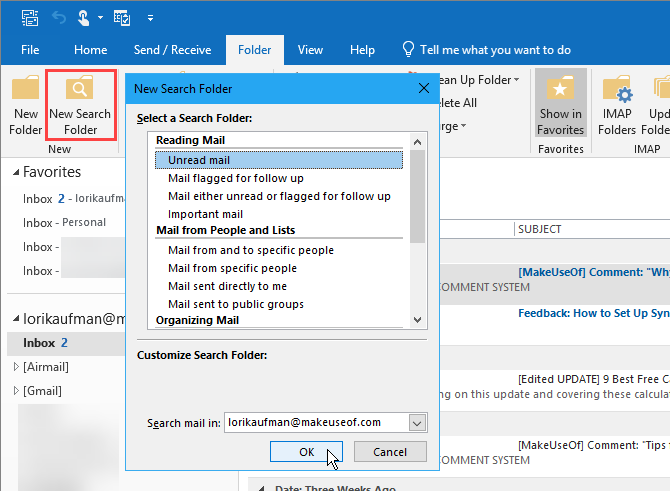
If you search for the same words and phrases in Outlook often, you can set up a virtual Search Folder that shows you a list of all items that match certain search criteria. Outlook provides some templates for Search Folders or you can create your own.
For example, the Unread Mail Search Folder shows you all your unread mail in one folder, even if they’re in different folders in your email account. The messages are not moved to the Search Folder, they’re only shown there. The original messages remain in their respective folders.
To create a new Search Folder, click New Search Folder in the New section on the Folder tab. Select a ready-made Search Folder template from the list or select Create a custom Search Folder under Custom at the bottom of the list.
If you’re creating a custom Search Folder, click Choose on the New Search Folder dialog box.
Then, enter a Name for the Search Folder on the Custom Search Folder dialog box. Click Criteria and specify the details of the search on the Search Folder Criteria dialog box.
If this is not working for you, we have some methods you can use fix Outlook Search.
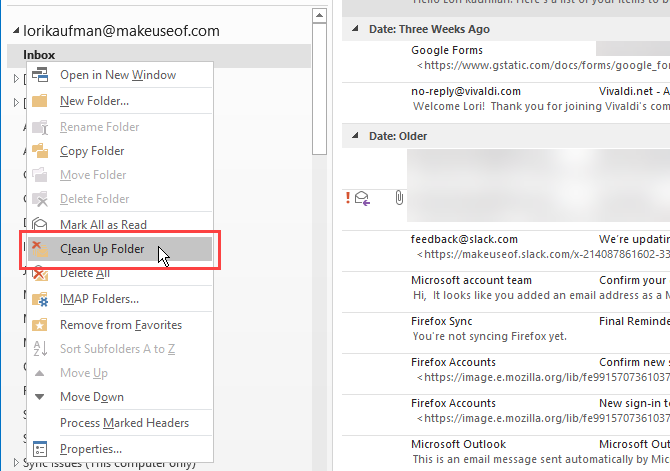
Outlook’s Clean Up Folder feature removes redundant messages in a thread or folder. Redundant messages are previous messages in a thread also quoted in the replies. Long email threads could end up with several copies of earlier messages that are quoted in each reply.
The Clean Up Folder command moves the redundant messages in the selected folder and its subfolders to the Deleted Items folder by default.
To use this command, right-click on the folder you want to clean up and select Clean Up Folder.
You can set the options for the Clean Up Folder command by going to File > Options > Mail > Conversation Clean Up. Select the folder you want the cleaned-up items to be moved to and enable or disable any other clean-up options you want.
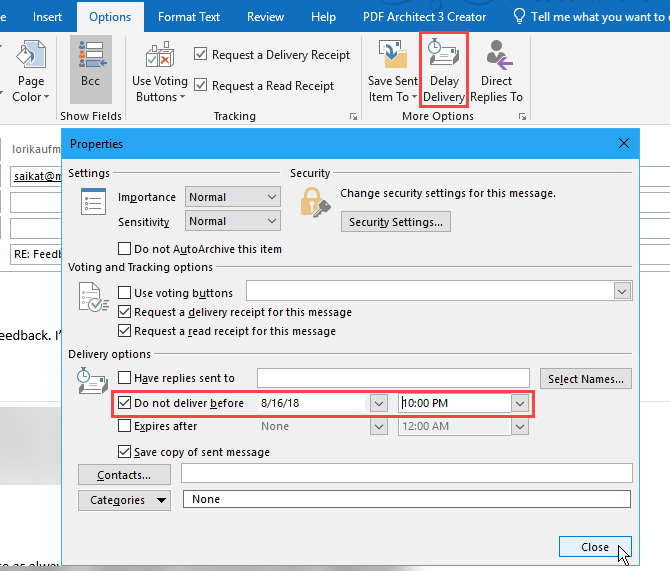
Sometimes you need to write an email but not send it until a later time. Outlook’s Delayed Delivery feature allows you to easily do this.
First, write your new email or reply to an email. Then, click Delay Delivery in the More Options section on the Options tab in the message window.
Under Delivery options, check the Do not deliver before box and select a date and time.
Select any other options you want and click Close.
Outlook stores scheduled email messages in your Outbox until they are sent when they are moved to your Sent folder.
If you change your mind and need to cancel the delayed delivery or change it to a different date and time, go to your Outbox and open the email message. Click Delay Delivery on the Options tab again and change the date and time for the Do not deliver before option or uncheck the box to disable delayed delivery.
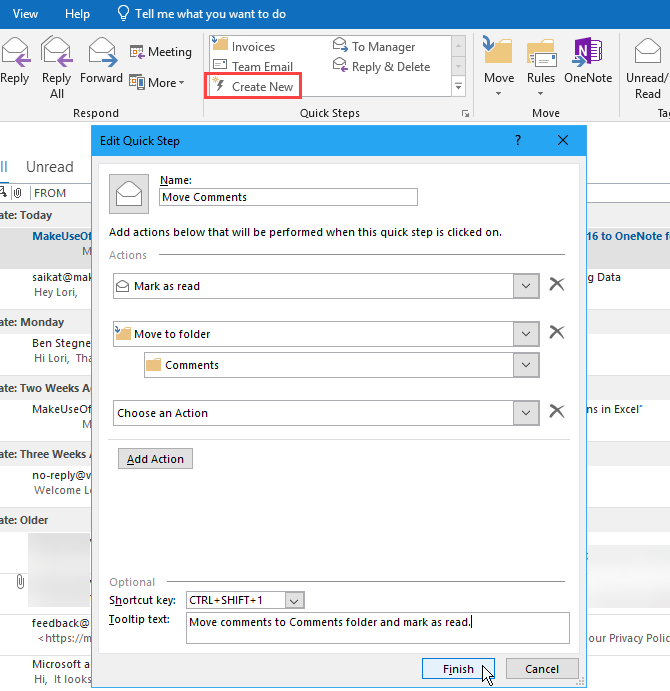
The Quick Steps section of the Home tab in Outlook provides one-click access to common actions. Microsoft provides some initial Quick Steps to start with, but you can also create your own.
To create a custom Quick Step, click Create New in the Quick Steps section. On the Edit Quick Step dialog box, Name your Quick Step.
Then, select an action from the dropdown list and click Add Action. Keep adding other actions you want to take in the same Quick Step, clicking Add Action after each one.
For example, you can set up a Quick Step to mark selected email messages as read and then move them to a certain folder.
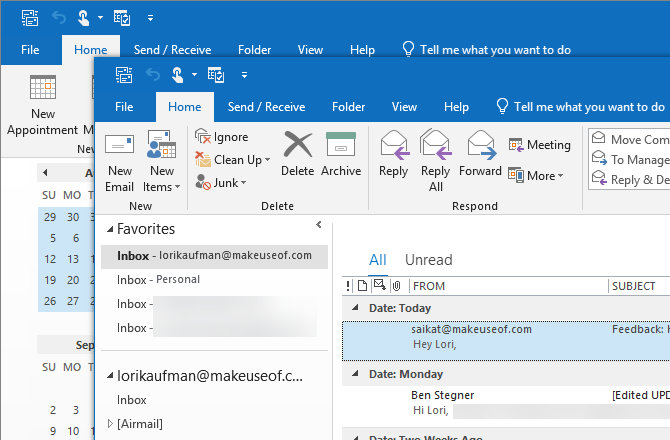
If you use Outlook for email, scheduling, and tasks, you might want to open multiple Outlook windows. That allows you to see your email, calendar, and tasks at the same time instead of using the navigation buttons to keep switching views.
To open another Outlook window, right-click on the Outlook icon on the Taskbar and select Outlook 2016. Position the windows how you want.
When you close Outlook, go to File > Exit on any of the open windows. Do not click the X in the upper-right corner of any of the windows. Outlook will open the next time with the same number of windows and in the same position they were in when you exited Outlook.
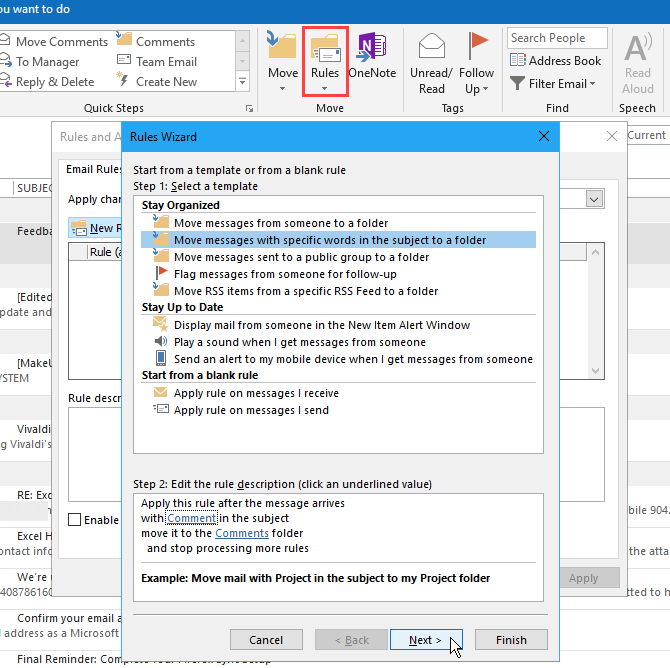
You may not always like playing by the rules, but rules in Outlook can be very useful. They allow you to set up specific events to happen automatically based on actions that occur.
For example, you may want to move messages with specific words in the subject line or from a specific person to a folder and mark the messages as read at the same time. You can create a rule to do all that at once as you receive messages.
To create or manage rules, click Rules in the Move section on the Home tab and select Manage Rules & Alerts. The Rules and Alerts dialog box allows you to create, change, and manually run rules.
Click New Rule to create a rule and then follow the steps in the Rules Wizard.
One feature lacking in Outlook is the ability to automatically BCC yourself on emails. But you can get around this limitation using rules.
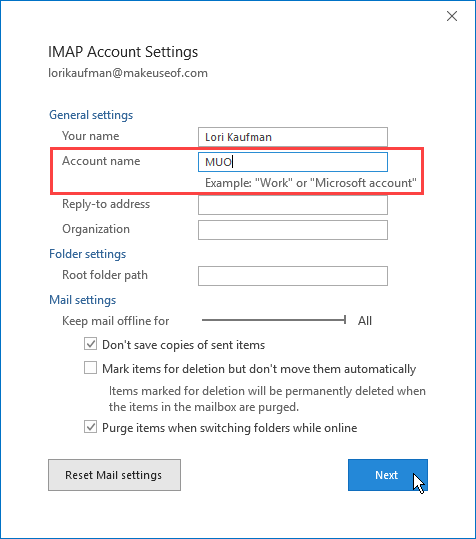
When you add an email account to Outlook, the default name for the account is your email address, which displays in the left pane. But you can change the account name to a more descriptive one that would make it faster to spot the account you’re looking for. Helpful if you have a lot of email accounts in Outlook.
To change an account name, right-click on the current account name in the left pane (not the Inbox for the account) and select Account Properties. Or go to File > Info (the Account Information screen).
Then, go to Account Settings > Account Settings and make sure the Email tab is active on the Account Settings dialog box. It should be by default.
Select the account in the list you want to change the name for (if it’s not already selected) and then click Change.
Change the Account name under General Settings on the Account Settings dialog box. Click Next and then click Done.
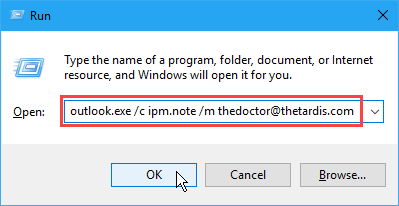
Outlook provides command line switches that allow you to perform various operations. If you prefer using the keyboard rather than the mouse, you can speed up operations in Outlook using the command line switches. They can also help you troubleshoot problems in Outlook.
We’ve covered 25 Outlook 2016 command line switches you should know.
For example, you can create a new email message with a recipient by opening the Run dialog box (Windows key + R) and entering the following command in the Open box, replacing the email address with your recipient’s address.
outlook.exe /c ipm.note /m thedoctor@thetardis.com
If all the great features in Outlook, even the lesser known ones, are not enough for you, we’ve covered some useful third-party Outlook tools that add functionality to Outlook or improve existing features.
Also, don’t forget that alongside the great features there are many Outlook shortcuts that can help you save time.
Read the full article: 10 Hidden Features of Microsoft Outlook That Are Rarely Used
![]() Hello, my name is Srikanth. I'm interested in learning new things and sharing with everyone.
Hello, my name is Srikanth. I'm interested in learning new things and sharing with everyone.
Learn More →